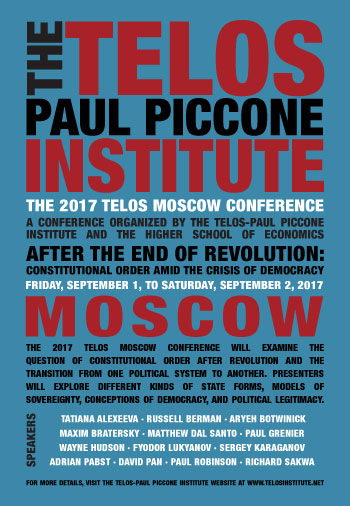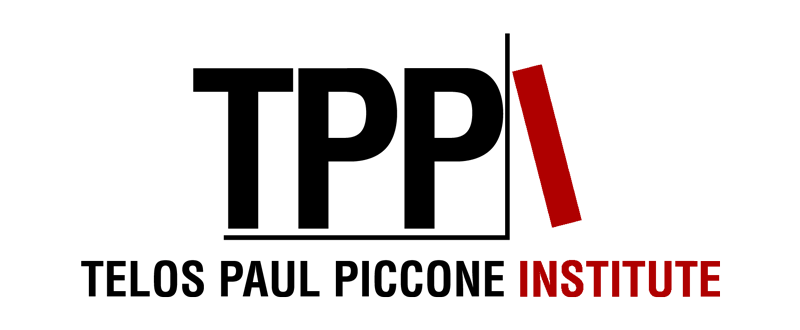The 2017 Telos Moscow Conference
September 1–2, 2017
Higher School of Economics
Moscow, Russia
After the End of Revolution:
Constitutional Order amid the Crisis of Democracy
A conference organized by the Telos-Paul Piccone Institute and Higher School of Economics, Moscow, September 1–2, 2017, at the HSE in Moscow.
View the conference program (PDF)
Conference papers posted at the Telos Press website
Conference Description
 Twenty-five years after the end of the Cold War, there is arguably a crisis of democracy: not only has the transition from totalitarian communism failed to bring about liberal market capitalism, but politics in mature democracies has been becoming post-democratic. Models of authoritarianism and state capitalism are spreading in different parts of the world, while countries with long-standing democratic traditions are characterized by a rejection of the political mainstream and a turn to extremes on the far left or the far right.
Twenty-five years after the end of the Cold War, there is arguably a crisis of democracy: not only has the transition from totalitarian communism failed to bring about liberal market capitalism, but politics in mature democracies has been becoming post-democratic. Models of authoritarianism and state capitalism are spreading in different parts of the world, while countries with long-standing democratic traditions are characterized by a rejection of the political mainstream and a turn to extremes on the far left or the far right.
Former transition countries in Eastern Europe and the post-Soviet space exhibit a wide variety of political systems and different degrees of democratic or authoritarian rule—think of the Czech Republic, Poland, Hungary, as well as Georgia, Russia, and Belarus. What we are seeing is not simply the coexistence between formally liberal-democratic constitutions and really existing anti-liberal authoritarian regimes, but also very different constitutional traditions and political cultures linked to the separation of powers, autonomous civil society institutions, and competing ideologies—especially the confrontation between progressive, globalizing liberalism and national conservatism.
Mature democracies, meanwhile, face not simply a backlash against the effects of globalization and growing clamor for more protectionism and perhaps even isolationism. More fundamentally, there is significant evidence of an increasing disaffection among diverse groups in society with democratic forms of government, which is accompanied by a deeper skepticism toward liberal institutions—political parties, the established press, and the legislature—and the related institutions of democratic capitalism—banks and financial institutions, professional associations, and trade unions.
Moreover, across the West and beyond, the lines between sovereignty and interference, the rule of law and lawlessness, democracy and forms of authoritarianism are becoming blurred. Other binaries are also in question, including left-right and elite-people, as both old and new polarities are coming to the fore: globalist-nativist, technocracy-populism, old elites versus new classes, etc. There are thus both domestic/national and global questions about constitutional order and democratic rule.
The theme of this conference is the question of constitutional order after revolution and the transition from one political system to another. Amid the crisis of existing models, there is both an intellectual and a practical urgency to explore different kinds of state forms, models of sovereignty, conceptions of democracy, and political legitimacy. Crucially, the focus is less on the purely institutional arrangements or the policy dimension and more on enduring cultural norms and social practices that underpin both constitution and politics.
The specific topics of the conference include, but are not limited to, the following:
- constitution, culture and civilization
- constitutional order and political system
- federalism and the distribution of power
- democratic constitution and authoritarian power
- post-democracy (e.g. Jacques Rancière, Colin Crouch) and the idea of "inverted totalitarianism" (Sheldon Wolin)
- alternative models of democracy: liberal, sovereign, plural, managed
- tensions between democracy and republican or monarchical constitutions
- the end of the transition paradigm tens years on
- the legacy of the Tsarist Empire and the Soviet Union
- constitutional arrangements after revolutions (Russian Revolution, Chinese Revolution) and after the end of revolutions (1989, Arab Spring)
- avenues not taken: constitutional monarchy, parliamentary democracy and confederal associations (post-Communist Russia, European Union)
Confirmed Speakers
Tatiana Alexeeva
Russell Berman
Aryeh Botwinick
Maxim Bratersky
Matthew Dal Santo
Paul Grenier
Wayne Hudson
Fyodor Lukyanov
Sergey Karaganov
Adrian Pabst
David Pan
Paul Robinson
Richard Sakwa
